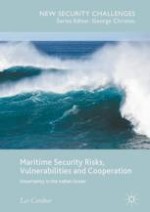2018 | OriginalPaper | Chapter
6. Indian Ocean Maritime Security Cooperative Arrangements
Author : Lee Cordner
Published in: Maritime Security Risks, Vulnerabilities and Cooperation
Publisher: Springer International Publishing
Activate our intelligent search to find suitable subject content or patents.
Select sections of text to find matching patents with Artificial Intelligence. powered by
Select sections of text to find additional relevant content using AI-assisted search. powered by
